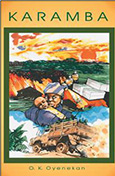
 |
Oyenekan’s novel blends symbolism, metaphor, and narrative, to plea for science over superstition, education over ignorance, and responsibility over gratification. It is a cautionary tale reminding us that the most intimate decisions individuals make, often reverberate far beyond only those initially involved.
The setting is Africa. The situation is dire. An AIDS pandemic is beginning to take a fatal toll. One after another, people are becoming sick, then critically ill, and eventually dying. Worldwide health organizations are shipping in money and supplies to fight the dreaded disease, but the corrupt government is keeping the cash, sporadically distributing condoms, and only making a show of trying to actually eradicate the killer.
Within this backdrop, the honest and dedicated Doctor Cinzano does his best to make his patients realize the seriousness of their actions and to reveal the farcical attempt the authorities are making to thwart the malady’s relentless spread. Old, young, and in-between continue to get sick and die. Finally, in a courtroom scene with dramatic echoes of France’s infamous Dreyfus affair, the doctor takes on the government to empower the governed.
By personalizing the indiscriminate nature of AIDS to specific individuals who are brought vividly to life, and death, Oyenekan involves readers on a visceral level. He is adept at soaring prose as well as tight dialogue. His use of a combined African/English street-speak is sometimes hard to understand, yet it adds realism and believability. In the end, Karamba is a tale of both the powerful and the powerless and how a disease such as AIDS finds no distinction between the two.